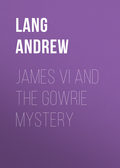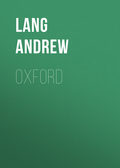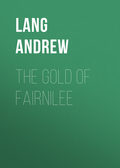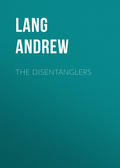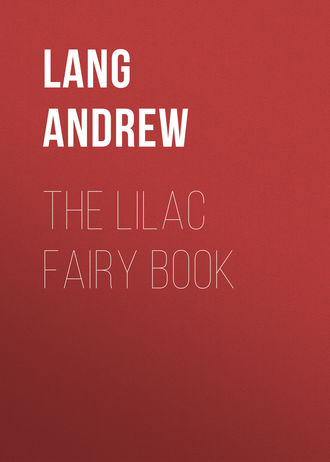
Lang Andrew
The Lilac Fairy Book
'Ah! you are the pretty girl who was to come and save me!'
'To save you!' repeated Bellah. 'But who are you, my little friend?'
'I am the husband of the Groac'h of the isle of Lok, and it is owing to her that I am here.'
'But what are you doing in this nest?'
'I am sitting on six eggs of stone, and I shall not be set free till they are hatched.'
On hearing this Bellah began to laugh.
'Poor little cock!' she said, 'and how am I to deliver you?'
'By delivering Houarn, who is in the power of the Groac'h.'
'Ah! tell me how I can manage that, and if I have to walk round the whole of Brittany on my bended knees I will do it!'
'Well, first you must dress yourself as a young man, and then go and seek the Groac'h. When you have found her you must contrive to get hold of the net of steel that hangs from her waist, and shut her up in it for ever.'
'But where am I to find a young man's clothes?' asked she.
'I will show you,' he replied, and as he spoke he pulled out three of his red hairs and blew them away muttering something the while. In the twinkling of an eye the four hairs changed into four tailors, of whom the first carried a cabbage, the second a pair of scissors, the third a needle, and the fourth an iron. Without waiting for orders, they sat down in the nest and, crossing their legs comfortably, began to prepare the suit of clothes for Bellah.
With one of the leaves of the cabbage they made her a coat, and another served for a waistcoat; but it took two for the wide breeches which were then in fashion. The hat was cut from the heart of the cabbage, and a pair of shoes from the thick stem. And when Bellah had put them all on you would have taken her for a gentleman dressed in green velvet, lined with white satin.
She thanked the little men gratefully, and after a few more instructions, jumped on the back of her great bird and was borne away to the isle of Lok. Once there, she bade him transform himself back into a stick, and with it in her hand she stepped into the blue boat, which conducted her to the palace of shells.
The Groac'h seemed overjoyed to see her, and told her that never before had she beheld such a handsome young man. Very soon she led her visitor into the great hall, where wine and fruit were always waiting, and on the table lay the magic knife, left there by Houarn. Unseen by the Groac'h, Bellah hid it in a pocket of her green coat, and then followed her hostess into the garden, and to the pond which contained the fish, their sides shining with a thousand different colours.
'Oh! what beautiful, beautiful creatures!' said she. 'I'm sure I should never be tired of watching them.' And she sat down on the bank, with her elbows on her knees and her chin in her hands, her eyes fixed on the fishes as they flashed past.
'Would you not like to stay here always?' asked the Groac'h; and Bellah answered that she desired nothing better.
'Then you have only to marry me,' said the Groac'h. 'Oh! don't say no, for I have fallen deeply in love with you.'
'Well, I won't say "No,"' replied Bellah, with a laugh, 'but you must promise first to let me catch one of those lovely fish in your net.'
'It is not so easy as it looks,' rejoined the Groac'h, smiling, 'but take it, and try your luck.'
Bellah took the net which the Groac'h held out, and, turning rapidly, flung it over the witch's head.
'Become in body what you are in soul!' cried she, and in an instant the lovely fairy of the sea was a toad, horrible to look upon. She struggled hard to tear the net asunder, but it was no use. Bellah only drew it the tighter, and, flinging the sorceress into a pit, she rolled a great stone across the mouth, and left her.
As she drew near the pond she saw a great procession of fishes advancing to meet her, crying in hoarse tones:
'This is our lord and master, who has saved us from the net of steel and the pot of gold!'
'And who will restore you to your proper shapes,' said Bellah, drawing the knife from her pocket. But just as she was going to touch the foremost fish, her eyes fell on a green frog on his knees beside her, his little paws crossed over his little heart. Bellah felt as if fingers were tightening round her throat, but she managed to cry:
'Is this you, my Houarn? Is this you?'
'It is I,' croaked the little frog; and as the knife touched him he was a man again, and, springing up, he clasped her in his arms.
'But we must not forget the others,' she said at last, and began to transform the fishes to their proper shapes. There were so many of them that it took quite a long time. Just as she had finished there arrived the little dwarf from the Deer's Leap in a car drawn by six cockchafers, which once had been the six stone eggs.
'Here I am!' he exclaimed. 'You have broken the spell that held me, and now come and get your reward,' and, dismounting from his chariot, he led them down into the caves filled with gold and jewels, and bade Bellah and Houarn take as much as they wanted.
When their pockets were full, Bellah ordered her stick to become a winged carriage, large enough to bear them and the men they had rescued back to Lanillis.
There they were married the next day, but instead of setting up housekeeping with the little cow and pig to fatten that they had so long wished for, they were able to buy lands for miles round for themselves, and gave each man who had been delivered from the Groac'h a small farm, where he lived happily to the end of his days.
From 'Le Foyer Breton,' par E. Souvestre
THE ESCAPE OF THE MOUSE
Manawyddan the prince and his friend Pryderi were wanderers, for the brother of Manawyddan had been slain, and his throne taken from him. Very sorrowful was Manawyddan, but Pryderi was stout of heart, and bade him be of good cheer, as he knew a way out of his trouble.
'And what may that be?' asked Manawyddan.
'It is that thou marry my mother Rhiannon and become lord of the fair lands that I will give her for dowry. Never did any lady have more wit than she, and in her youth none was more lovely; even yet she is good to look upon.'
'Thou art the best friend that ever a man had,' said Manawyddan. 'Let us go now to seek Rhiannon, and the lands where she dwells.'
Then they set forth, but the news of their coming ran swifter still, and Rhiannon and Kicva, wife of Pryderi, made haste to prepare a feast for them. And Manawyddan found that Pryderi had spoken the truth concerning his mother, and asked if she would take him for her husband. Right gladly did she consent, and without delay they were married, and rode away to the hunt, Rhiannon and Manawyddan, Kicva and Pryderi, and they would not be parted from each other by night or by day, so great was the love between them.
One day, when they were returned, they were sitting out in a green place, and suddenly the crash of thunder struck loudly on their ears, and a wall of mist fell between them, so that they were hidden one from the other. Trembling they sat till the darkness fled and the light shone again upon them, but in the place where they were wont to see cattle, and herds, and dwellings, they beheld neither house nor beast, nor man nor smoke; neither was any one remaining in the green place save these four only.
'Whither have they gone, and my host also?' cried Manawyddan, and they searched the hall, and there was no man, and the castle, and there was none, and in the dwellings that were left was nothing save wild beasts. For a year these four fed on the meat that Manawyddan and Pryderi killed out hunting, and the honey of the bees that sucked the mountain heather. For a time they desired nothing more, but when the next year began they grew weary.
'We cannot spend our lives thus,' said Manawyddan at last, 'let us go into England and learn some trade by which we may live.' So they left Wales, and went to Hereford, and there they made saddles, while Manawyddan fashioned blue enamel ornaments to put on their trappings. And so greatly did the townsfolk love these saddles, that no others were bought throughout the whole of Hereford, till the saddlers banded together and resolved to slay Manawyddan and his companions.
When Pryderi heard of it, he was very wroth, and wished to stay and fight. But the counsels of Manawyddan prevailed, and they moved by night to another city.
'What craft shall we follow?' asked Pryderi.
'We will make shields,' answered Manawyddan.
'But do we know anything of that craft?' answered Pryderi.
'We will try it,' said Manawyddan, and they began to make shields, and fashioned them after the shape of the shields they had seen; and these likewise they enamelled. And so greatly did they prosper that no man in the town bought a shield except they had made it, till at length the shield-makers banded together as the saddlers had done, and resolved to slay them. But of this they had warning, and by night betook themselves to another town.
'Let us take to making shoes,' said Manawyddan, 'for there are not any among the shoemakers bold enough to fight us.'
'I know nothing of making shoes,' answered Pryderi, who in truth despised so peaceful a craft.
'But I know,' replied Manawyddan, 'and I will teach thee to stitch. We will buy the leather ready dressed, and will make the shoes from it.'
Then straightway he sought the town for the best leather, and for a goldsmith to fashion the clasps, and he himself watched till it was done, so that he might learn for himself. Soon he became known as 'The Maker of Gold Shoes,' and prospered so greatly, that as long as one could be bought from him not a shoe was purchased from the shoemakers of the town. And the craftsmen were wroth, and banded together to slay them.
'Pryderi,' said Manawyddan, when he had received news of it, 'we will not remain in England any longer. Let us set forth to Dyved.'
So they journeyed until they came to their lands at Narberth. There they gathered their dogs round them, and hunted for a year as before.
After that a strange thing happened. One morning Pryderi and Manawyddan rose up to hunt, and loosened their dogs, which ran before them, till they came to a small bush. At the bush, the dogs shrank away as if frightened, and returned to their masters, their hair bristling on their backs.
'We must see what is in that bush,' said Pryderi, and what was in it was a boar, with a skin as white as the snow on the mountains. And he came out, and made a stand as the dogs rushed on him, driven on by the men. Long he stood at bay; then at last he betook himself to flight, and fled to a castle which was newly built, in a place where no building had ever been known. Into the castle he ran, and the dogs after him, and long though their masters looked and listened, they neither saw nor heard aught concerning dogs or boar.
'I will go into the castle and get tidings of the dogs,' said Pryderi at last.
'Truly,' answered Manawyddan, 'thou wouldst do unwisely, for whosoever has cast a spell over this land has set this castle here.'
'I cannot give up my dogs,' replied Pryderi, and to the castle he went.
But within was neither man nor beast; neither boar nor dogs, but only a fountain with marble round it, and on the edge a golden bowl, richly wrought, which pleased Pryderi greatly. In a moment he forgot about his dogs, and went up to the bowl and took hold of it, and his hands stuck to the bowl, and his feet to the marble slab, and despair took possession of him.
Till the close of day Manawyddan waited for him, and when the sun was fast sinking, he went home, thinking that he had strayed far.
'Where are thy friend and thy dogs?' said Rhiannon, and he told her what had befallen Pryderi.
'A good friend hast thou lost,' answered Rhiannon, and she went up to the castle and through the gate, which was open. There, in the centre of the courtyard, she beheld Pryderi standing, and hastened towards him.
'What dost thou here?' she asked, laying her hand on the bowl, and as she spoke she too stuck fast, and was not able to utter a word. Then thunder was heard and a veil of darkness descended upon them, and the castle vanished and they with it.
When Kicva, the wife of Pryderi, found that neither her husband nor his mother returned to her, she was in such sorrow that she cared not whether she lived or died. Manawyddan was grieved also in his heart, and said to her:
'It is not fitting that we should stay here, for we have lost our dogs and cannot get food. Let us go into England – it is easier for us to live there.' So they set forth.
'What craft wilt thou follow?' asked Kicva as they went along.
'I shall make shoes as once I did,' replied he; and he got all the finest leather in the town and caused gilded clasps to be made for the shoes, till everyone flocked to buy, and all the shoemakers in the town were idle and banded together in anger to kill him. But luckily Manawyddan got word of it, and he and Kicva left the town one night and proceeded to Narberth, taking with him a sheaf of wheat, which he sowed in three plots of ground. And while the wheat was growing up, he hunted and fished, and they had food enough and to spare. Thus the months passed until the harvest; and one evening Manawyddan visited the furthest of his fields of wheat; and saw that it was ripe.
'To-morrow I will reap this,' said he; but on the morrow when he went to reap the wheat he found nothing but the bare straw.
Filled with dismay he hastened to the second field, and there the corn was ripe and golden.
'To-morrow I will reap this,' he said, but on the morrow the ears had gone, and there was nothing but the bare straw.
'Well, there is still one field left,' he said, and when he looked at it, it was still fairer than the other two. 'To-night I will watch here,' thought he, 'for whosoever carried off the other corn will in like manner take this, and I will know who it is.' So he hid himself and waited.
The hours slid by, and all was still, so still that Manawyddan well-nigh dropped asleep. But at midnight there arose the loudest tumult in the world, and peeping out he beheld a mighty host of mice, which could neither be numbered nor measured. Each mouse climbed up a straw till it bent down with its weight, and then it bit off one of the ears, and carried it away, and there was not one of the straws that had not got a mouse to it.
Full of wrath he rushed at the mice, but he could no more come up with them than if they had been gnats, or birds of the air, save one only which lingered behind the rest, and this mouse Manawyddan came up with. Stooping down he seized it by the tail, and put it in his glove, and tied a piece of string across the opening of the glove, so that the mouse could not escape. When he entered the hall where Kicva was sitting, he lighted a fire, and hung the glove up on a peg.
'What hast thou there?' asked she.
'A thief,' he answered, 'that I caught robbing me.'
'What kind of a thief may it be which thou couldst put in thy glove?' said Kicva.
'That I will tell thee,' he replied, and then he showed her how his fields of corn had been wasted, and how he had watched for the mice.
'And one was less nimble than the rest, and is now in my glove. To-morrow I will hang it, and I only wish I had them all.'
'It is a marvel, truly,' said she, 'yet it would be unseemly for a man of thy dignity to hang a reptile such as this. Do not meddle with it, but let it go.'
'Woe betide me,' he cried, 'if I would not hang them all if I could catch them, and such as I have I will hang.'
'Verily,' said she, 'there is no reason that I should succour this reptile, except to prevent discredit unto thee.'
'If I knew any cause that I should succour it, I would take thy counsel,' answered Manawyddan, 'but as I know of none, I am minded to destroy it.'
'Do so then,' said Kicva.
So he went up a hill and set up two forks on the top, and while he was doing this he saw a scholar coming towards him, whose clothes were tattered. Now it was seven years since Manawyddan had seen man or beast in that place, and the sight amazed him.
'Good day to thee, my lord,' said the scholar.
'Good greeting to thee, scholar. Whence dost thou come?'
'From singing in England; but wherefore dost thou ask?'
'Because for seven years no man hath visited this place.'
'I wander where I will,' answered the scholar. 'And what work art thou upon?'
'I am about to hang a thief that I caught robbing me!'
'What manner of thief is that?' inquired the scholar. 'I see a creature in thy hand like unto a mouse, and ill does it become a man of thy rank to touch a reptile like this. Let it go free.'
'I will not let it go free,' cried Manawyddan. 'I caught it robbing me, and it shall suffer the doom of a thief.'
'Lord!' said the scholar, 'sooner than see a man like thee at such a work, I would give thee a pound which I have received as alms to let it go free.'
'I will not let it go free, neither will I sell it.'
'As thou wilt, lord,' answered the scholar, and he went his way.
Manawyddan was placing the cross-beam on the two forked sticks, where the mouse was to hang, when a priest rode past.
'Good-day to thee, lord; and what art thou doing?'
'I am hanging a thief that I caught robbing me.'
'What manner of thief, lord?'
'A creature in the form of a mouse. It has been robbing me, and it shall suffer the doom of a thief.'
'Lord,' said the priest, 'sooner than see thee touch this reptile, I would purchase its freedom.'
'I will neither sell it nor set it free.'
'It is true that a mouse is worth nothing, but rather than see thee defile thyself with touching such a reptile as this, I will give thee three pounds for it.'
'I will not take any price for it. It shall be hanged as it deserves.'
'Willingly, my lord, if it is thy pleasure.' And the priest went his way.
Then Manawyddan noosed the string about the mouse's neck, and was about to draw it tight when a bishop, with a great following and horses bearing huge packs, came by.
'What work art thou upon?' asked the bishop, drawing rein.
'Hanging a thief that I caught robbing me.'
'But is not that a mouse that I see in thine hand?' asked the bishop.
'Yes; that is the thief,' answered Manawyddan.
'Well, since I have come at the doom of this reptile, I will ransom it of thee for seven pounds, rather than see a man of thy rank touch it. Loose it, and let it go!'
'I will not let it loose.'
'I will give thee four and twenty pounds to set it free,' said the bishop.
'I will not set it free for as much again.'
'If thou wilt not set it free for this, I will give thee all the horses thou seest and the seven loads of baggage.'
'I will not set it free.'
'Then tell me at what price thou wilt loose it, and I will give it.'
'The spell must be taken off Rhiannon and Pryderi,' said Manawyddan.
'That shall be done.'
'But not yet will I loose the mouse. The charm that has been cast over all my lands must be taken off likewise.'
'This shall be done also.'
'But not yet will I loose the mouse till I know who she is.'
'She is my wife,' answered the bishop.
'And wherefore came she to me?' asked Manawyddan.
'To despoil thee,' replied the bishop, 'for it is I who cast the charm over thy lands, to avenge Gwawl the son of Clud my friend. And it was I who threw the spell upon Pryderi to avenge Gwawl for the trick that had been played on him in the game of Badger in the Bag. And not only was I wroth, but my people likewise, and when it was known that thou wast come to dwell in the land, they besought me much to change them into mice, that they might eat thy corn. The first and the second nights it was the men of my own house that destroyed thy two fields, but on the third night my wife and her ladies came to me and begged me to change them also into the shape of mice, that they might take part in avenging Gwawl. Therefore I changed them. Yet had she not been ill and slow of foot, thou couldst not have overtaken her. Still, since she was caught, I will restore thee Pryderi and Rhiannon, and will take the charm from off thy lands. I have told thee who she is; so now set her free.'
'I will not set her free,' answered Manawyddan, 'till thou swear that no vengeance shall be taken for this, either upon Pryderi, or upon Rhiannon, or on me.'
'I grant thee this boon; and thou hast done wisely to ask it, for on thy head would have lit all the trouble. Set now my wife free.'
'I will not set her free till Pryderi and Rhiannon are with me.'
'Behold, here they come,' said the bishop.
Then Manawyddan held out his hands and greeted Pryderi and Rhiannon, and they seated themselves joyfully on the grass.
'Ah, lord, hast thou not received all thou didst ask?' said the bishop. 'Set now my wife free!'
'That I will gladly,' answered Manawyddan, unloosing the cord from her neck, and as he did so the bishop struck her with his staff, and she turned into a young woman, the fairest that ever was seen.
'Look around upon thy land,' said he, 'and thou wilt see it all tilled and peopled, as it was long ago.' And Manawyddan looked, and saw corn growing in the fields, and cows and sheep grazing on the hill-side, and huts for the people to dwell in. And he was satisfied in his soul, but one more question he put to the bishop.
'What spell didst thou lay upon Pryderi and Rhiannon?'
'Pryderi has had the knockers of the gate of my palace hung about him, and Rhiannon has carried the collars of my asses around her neck,' said the bishop with a smile.



